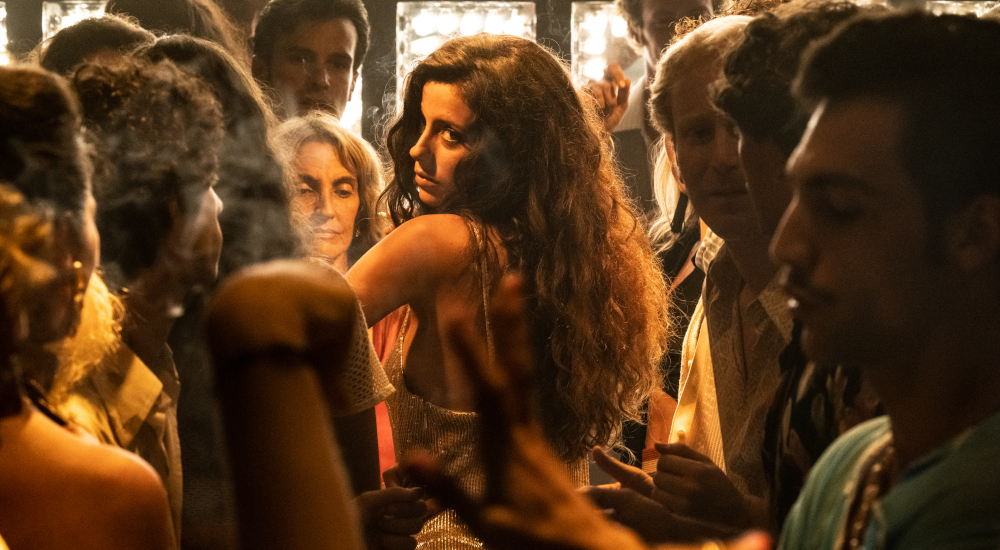"What are you thinking about?"
There's a lot to unravel with Paolo Sorrentino's Parthenope. And yet, there also isn't too much.
Enriched with visual beauty, the prolific director captures his alluring lead, showing her off like an exquisite, priceless artifact. The woman is, undeniably, the object of every man's desire. But as the camera pans across the intoxicating being, lingering for a few extra seconds to fully embrace her beauty, we are mesmerized by the seduction of it all. Later, when she asserts her intelligence during a conversation with a high-level suitor, we quickly learn that while stunning, she belongs to no one but herself.
Relative newcomer Celeste Dalla Porta gives a near-flawless performance as Parthenope. Effortlessly seductive yet strangely unbothered by the process, she is a true goddess among mortals. As the house staff stood on the balconies above, Parthenope was born on the shallow bank of the sea to a wealthy, well-cultured family. Named for the city just across the water, she becomes a breathtakingly beautiful, free-spirited woman who yearns for education and excels in nearly every conversation.
Though willing to give herself to an admirer, Parthenope keeps her heart to herself, a statement her brother all but makes clear during a quick conversation with one of her many then-suitors. Shortly after the trio leaves for a summer in Capri, we begin to witness the whimsical, almost tranquil approach taken to her life. Sorrentino often investigates the possibility that Parthenope is a victim of her own beauty, and maybe she is. But even within that context, she understands her place, refusing to step foot in the proverbial trap. It is almost ironic when she begins studying Anthropology at the university, especially considering she is never able to articulate an accurate definition of the subject. A witty, intellectual exchange with her professor during an oral assessment is both awkward and stimulating. I can't explain why the scene sticks, but it marks the onset of Parthenope's most open and honest adult relationship.
The film, presented in segmented episodes, follows as Parthenope forms a unique bond with several men who occupy different stages of her life. At one point, it is alcoholic American writer John Cheever (Gary Oldman). On another, it's her sullen university lecturer, Professor Marotta (Silvio Orlando). Not even her brother, Raimondo (Daniele Rienzo), is immune to his sister's magnetism. His mesmerizing infatuation leads to a fatal, incestuous passion, one that exists while she is entertaining another obsessed suitor, Sandrino (Dario Aita).
It's a lot to keep up with, but Sorrentino successfully navigates the intricate terrain, never losing sight of his star. After being discovered in a hotel restaurant for her beauty, Parthenope sidesteps her desire for an academic career to explore the possibility of being an actress. But that curiosity is quickly put to rest after she meets an aging star who clamors at a group of locals who swarm her in public. That isn't the life she desires. Nor is it one she would flourish in.
Like many, Parthenope's life becomes more complex and less enriched each year. It isn't until we jump forward several decades that we begin to piece together the larger, more conceptual puzzle. Here, we see an older woman. Mere moments ahead of her retirement, she is sitting, answering questions from a young pregnant student who, like herself years before, holds a keen fixation on her professor. Though short, deliberate, and heavily filtered, Parthenope's answers bear a moment of self-awareness. It's a rare instance of vulnerability that, until now, we haven't seen from our titular character.
In many ways, Parthenope is a standard Sorrentino film. Its visual brilliance is undeniable as the director utilizes every inch of the screen to set the picture and allow viewers to absorb the feel of the world created around them. As for our protagonist, I'm not confident with her growth or acceptance of the life she has lived. Quite reserved and often cold, it's hard to understand her thoughts and emotions. She needs to be in control. By her maintaining control, we are left on the surface, unable to dig and comprehend. Maybe that is the point. Maybe there is a vast metaphor that, if looked at closely, would become more obvious. But also, maybe not. I guess that's the beauty of the cinema—unlike Parthenope, beauty (and understanding) isn't entirely universal.

